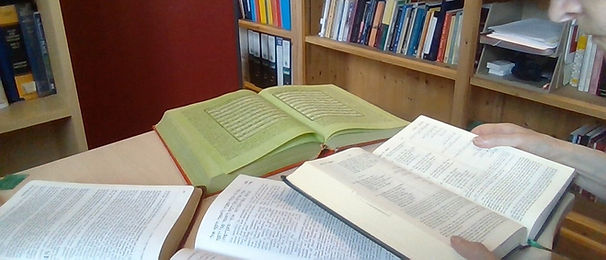
Qur'an and Bible 1: Torah
Next opportunity: Online internationally and Hybrid in Houston, Fridays 7.30-9.30 p.m., Fall 2024, beginning September 13th.
Course facilitators: Dr Ida Glaser, Dr Haris Dundar, Khurram Rehmatullah
The full cost is $400 per student, reduced to $150 for auditing students and for students from the 'majority world'.
Courses may be audited or taken for CMCS Houston credit or for credit through another institution. Auditing students who complete the class and group participation and short writing assignments will be awarded a certificate of completion.
Each week, we will have one hour online together, and then one hour in group work. The group in Houston will meet in person, and other groups internationally will meet online. If there are several students in other localities who wish to meet in person, we will encourage this.
Students who wish to obtain CMCS Houston credit for this course are required to do our free 'Research and Writing for Muslim & Christian Studies' or to demonstrate competence in academic writing. THE FIRST FIVE MODULES OF THIS SHOULD BE COMPLETED PRIOR TO THE START OF 'QUR'AN AND BIBLE 1'. This course may be begun at any time - students are advised to begin as soon as possible.
CMCS Houston has some half and full scholarships available. To request a scholarship, write to office@cmcshouston.org by August 28th. Include a c.v., a letter of application which explains why you need a scholarship; how you expect this course to help you in your studies and future work; and how you plan to use your learning to make a difference to Muslim-Christian relations. You should also give contact details for two referees who will support your application.
Qur'an and Bible 1 introduces students to the concept of reading the Holy Books together. It then develops biblical and qur'anic understandings of sacred history through a study of the narratives from Adam to Moses.
We begin by considering the nature of the Qur'an and of the Bible, and how they are regarded by Muslims, by Christians and by Jews. We then focus on the Torah, and ask how it is regarded in the New Testament and in the Qur'an.
The next stage is to develop skill in intertextual reading through a series of studies of characters common to the Qur'an and the Bible. This will be the core learning for the course. Students will be encouraged to view the texts through their own and each other's interpretative traditions as well as to study the texts themselves.
We will then be in a position to reflect on the questions about interpretation that are raised by the texts and the traditions, and on how current readers from different faith traditions handle those questions. We will finish by considering what we have learnt about the nature of the Holy Books we have been studying.
Program:
Topic 1: Learning to read Holy Books
Topic 2: Adam and Eve
Topic 3: Cain and Abel
Topic 4: Noah
Topic 5: Abraham and his sons
Topic 6: Jacob and his children
Topic 7: Moses and his family
Topic 8: What happened on Sinai?
Topic 9: Law in the Torah, the New Testament, and the Qur'an
Topic 10: Thinking about Holy Books
The right choice!
Worku Mohammed, Ethiopia
This class is suitable for accreditation at master's or final year undergraduate level. It offers 3 credit hours (40-45 hours of class or recorded online learning, with approx 90 hours of additional study and writing expected from each student). Preference will be given to students who have completed accredited modules/units of study (or the equivalent) in at least TWO of the following areas: Biblical Studies, Qur'anic Studies, Classical Arabic, Biblical Hebrew, New Testament Greek

